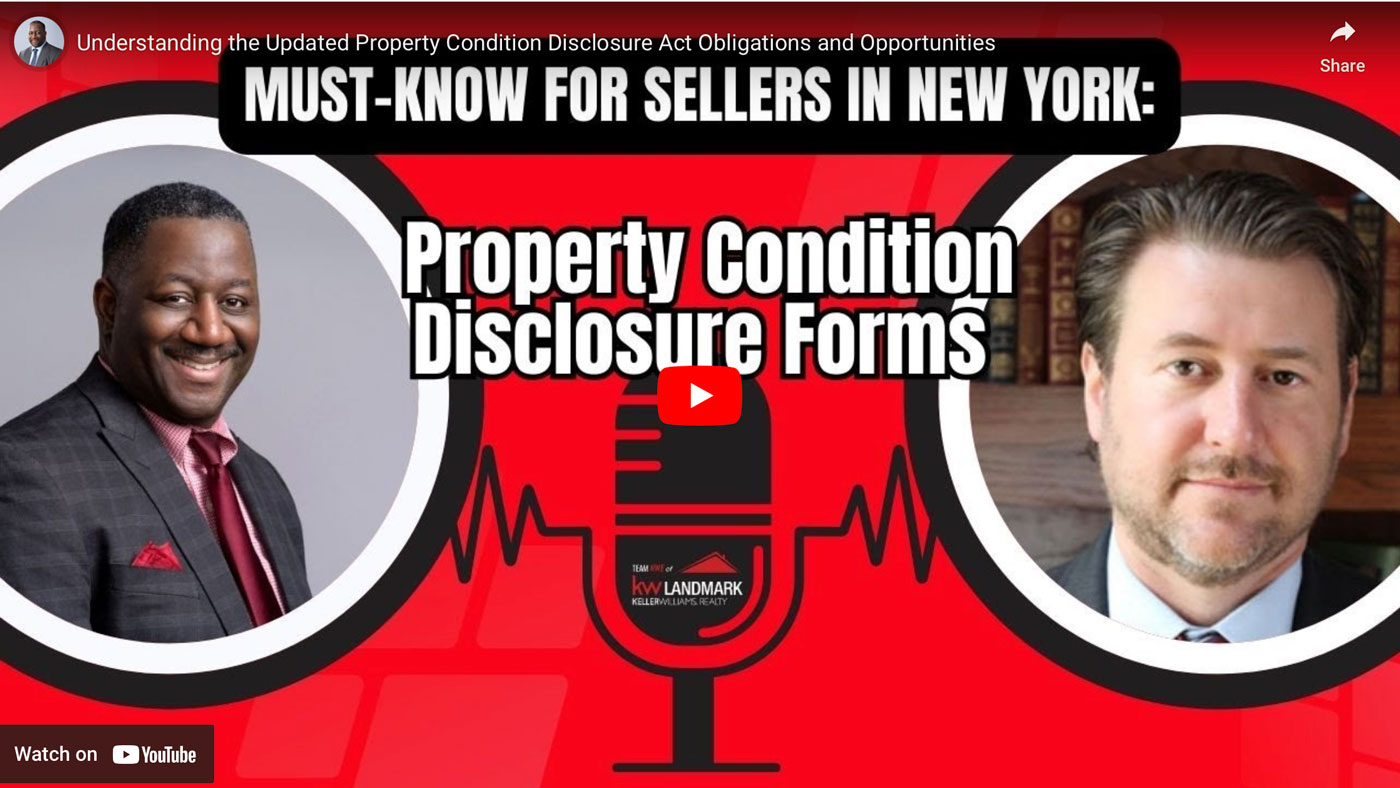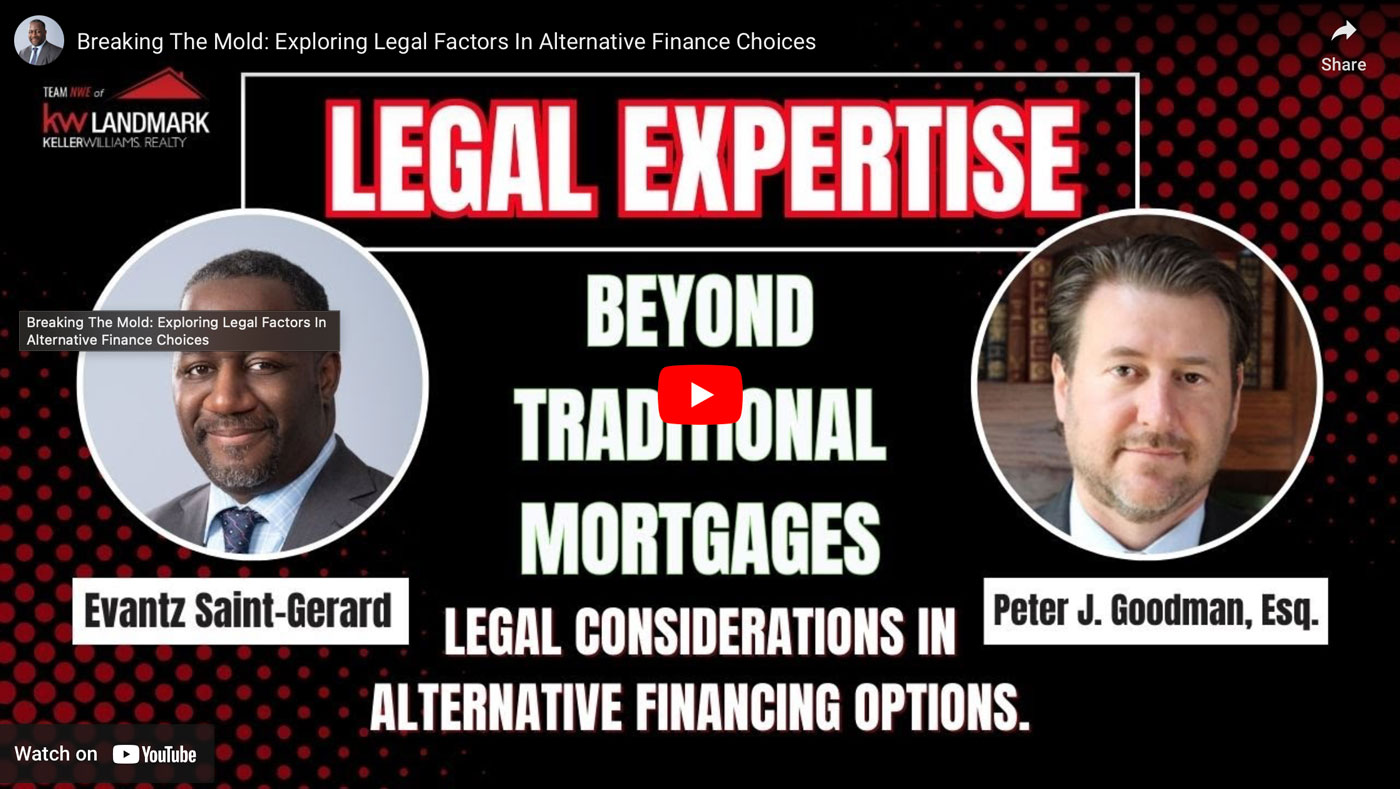In this episode, host Evantz Saint-Gerard interviews Peter J. Goodman, Esq about the changes in property disclosure laws. They discuss the Property Condition Disclosure Act and the new property condition disclosure statement. They explain who the law applies to and the reasons behind its implementation. They also cover the seller’s obligations, liability, and best practices for sellers and buyers. The importance of hiring a real estate attorney and the ability to negotiate contracts with disclosures are emphasized. The episode concludes with information on exclusions from the property condition disclosure, the effective date, and contact information for further inquiries.
Navigating Real Estate Joint Ventures
In this episode, Evantz Saint-Gerard and Peter J. Goodman discuss the ins and outs of real estate joint ventures. They cover topics such as the definition of a joint venture, the different legal structures available, the legal requirements, financial obligations, dispute resolution mechanisms, exit strategies, risk management, and future trends in the industry. The conversation emphasizes the importance of seeking professional help and creating comprehensive agreements to avoid potential pitfalls and disputes. Overall, the episode provides valuable insights for anyone considering entering into a real estate joint venture.
Breaking The Mold: Exploring Legal Factors In Alternative Finance Choices
VIDEO – Foreclosure and Short Sales Legal Guidance for Distressed Properties
This conversation discusses the legal aspects and guidance on distressed properties, specifically short sales and foreclosures. The speakers emphasize the importance of seeking help and removing shame when facing financial difficulties. They highlight the need to listen to professionals and follow their advice. Planning and having a backup plan are crucial when selling a distressed property. The short sale process is explained, including considerations for properties with tenants. Dealing with difficult tenants is also addressed. The conversation concludes with a reminder that there is always a way out and contact information for further assistance.
Secure Your Investment with Expertise 🏠⚖️ Contact Peter J. Goodman, Esq. at Berger, Fischoff, Shumer, Wexler & Goodman, LLP for unparalleled legal guidance. 🌟 Visit www.bfslawfirm.com or call us at 718-934-8811 | 516-747-1136. Your property deserves the best protection!
VIDEO – Title Insurance and Property Claims Protecting Your Real Estate Investment
In this conversation, Evan St. Gerard and Peter Goodman discuss how to protect your real estate investment. They cover the importance of title insurance, common misconceptions, the need for professional advice, the role of a real estate attorney, building the right team, negotiating and timing in real estate deals, choosing the right realtor, and the importance of prevention and knowledge in real estate transactions. They also provide words of encouragement for those considering buying and selling real estate.
Secure Your Investment with Expertise 🏠⚖️ Contact Peter J. Goodman, Esq. at Berger, Fischoff, Shumer, Wexler & Goodman, LLP for unparalleled legal guidance. 🌟 Visit www.bfslawfirm.com or call us at 718-934-8811 | 516-747-1136. Your property deserves the best protection!
What is a Partition Action?
What is a Partition Action and How Does It Affect Joint Property Owners in New York?
If you own a property with someone else, you may have different opinions on what to do with it. Maybe you want to sell it and split the money, but your co-owner wants to keep it. Or maybe you want to live in it, but your co-owner wants to rent it out. How can you resolve this conflict?
One option is to file a partition action. A partition action is a legal process that allows a joint property owner to force the sale of the property and get their share of the proceeds. This way, you don’t have to co-own the property if you don’t want to.
However, a partition action can also have negative consequences for both parties. It can be costly, time-consuming, and stressful. It can also result in losing the property at a low price or losing sentimental value. Therefore, before you decide to file a partition action, you should understand how it works and what alternatives you may have.
How Does a Partition Action Work in New York?
A partition action is filed in the Supreme Court of the county where the property is located. The person bringing the action (the Plaintiff) must prove that they are a joint owner of the property and that physical partition (dividing the property into separate parts) is not possible or would cause great prejudice to the parties. For example, if the property is a single-family home or an apartment, physical partition would not be feasible or would destroy its value.
If the plaintiff meets these requirements, the court will usually order the sale of the property and divide the proceeds among the co-owners according to their ownership interests. For example, if two co-owners each own 50% of the property, they will each get 50% of the sale proceeds.
However, there are some exceptions to this general rule. For instance, if there is a prior written agreement between the co-owners that prevents or limits the partition action, such as a contract or a corporation document, then the court will respect that agreement and not order the sale of the property.
Another exception is if the property is inherited by family members as tenants in common. In this case, New York law gives them some protection from partition actions by third parties who buy a share of the property and try to force a sale. The law allows the family members to first buy out each other’s interest before selling the property to a third party.
What Are Some Alternatives to a Partition Action?
A partition action should be considered as a last resort when there is no other way to resolve the conflict between co-owners. There are some alternatives that may be more beneficial for both parties, such as:
- Negotiating a voluntary sale or buyout: The co-owners can agree to sell the property together and split the proceeds, or one co-owner can buy out the other’s interest at a fair price.
- Creating a co-ownership agreement: The co-owners can create a written agreement that outlines their rights and responsibilities regarding the property, such as how to manage it, how to share expenses and income, how to resolve disputes, and how to exit the co-ownership.
- Seeking professional advice: The co-owners can consult with an experienced real estate lawyer who can help them understand their options and guide them through the legal process.
Conclusion
A partition action is a legal remedy for joint property owners who want to end their co-ownership.
However, it can also have drawbacks for both parties. Therefore, before filing a partition action, you should weigh your pros and cons and explore your alternatives.
If you need more information or assistance with your partition action or any other real estate matter in New York, please contact us at legal@bfslawfirm.com. We offer free consultations and affordable fees. We look forward to hearing from you soon!
Adjacent Real Property Access Licenses
Your Neighbor Needs Access to Your Property to Complete Their Construction Project
If you are a property owner in New York, you may be facing a situation where your neighbor needs access to your property to complete a construction project. This can be a difficult situation, as it may involve sacrificing some of your own property rights for the benefit of your neighbor. In this situation, it is important to understand the legal requirements and implications of granting a neighbor access to your property. An adjacent real property access license is a written agreement between two property owners that allows one party to access the land of the other for a specific purpose. This type of license is often used when a neighbor needs access to a portion of another’s property to complete a construction project. It is important to note that an adjacent real property access license is different from an easement, which is a permanent right to use another’s land for a particular purpose.
In New York, the requirements for an adjacent real property access license are outlined in the Real Property Law. The law states that the license must be in writing and signed by both parties, and that it must include the following information: 1. The purpose of the access: This must be stated with sufficient detail to describe the nature and extent of the access. 2. The duration of the access: This must be stated as a definite period of time. 3. The area of the access: This must be stated with sufficient detail to describe the boundaries of the area. 4. The compensation: This must be stated in the form of money or other consideration, such as a land exchange. 5. Any other terms and conditions: This may include restrictions on the use of the property, such as limitations on noise, dust, and debris, or any other conditions that the parties agree to in writing.
If you are considering granting access to your property to your neighbor, it is important to consult with an experienced real estate attorney to ensure that your rights and interests are protected. An attorney can help you negotiate a fair and favorable agreement, draft the license, and review the terms and conditions to make sure that they are enforceable and in the best interests of all parties involved. If you do decide to grant an adjacent real property access license, it is important to remember that it is a legally binding agreement and that you may be liable for any damages or injuries that occur on your property. It is also important to remember that you have the right to revoke the license at any time if your neighbor breaches any of the terms or conditions. Adjacent real property access licenses can be complex and difficult to navigate, so it is important to be aware of your rights and obligations if you are asked to grant access to your neighbor to complete their construction project. If you are considering granting access, it is important to consult with an experienced real estate attorney to ensure that your rights and interests are protected.
Buying Religious Corporate Property
Everyone Can Benefit: The Bargain Sale Transaction
With the cost of real estate in New York, it is becoming increasingly difficult for religious and non-profit organizations to be able to afford to purchase real estate. One way to reduce the out of pocket costs, is to structure the sale using a Bargain Sale to benefit both the Seller and the non-profit purchaser.
In New York (especially New York City), a seller who sells property significantly higher than when they purchased it, may be required to pay up to 40%-50% in taxes on the difference between their cost basis (the difference between the asset’s cost basis and the current market value) and the sales price. By using a Bargain Sale, a Seller may be able to avoid this tax.
Essentially, a Bargain Sale purchase allows a seller to reduce capital gains on a sale by selling property to a non-profit or religious organization for less than fair market value (FMV). The difference between the FMV and the amount realized, i.e., the “bargain element,” is intended to be a charitable contribution. The seller is donating the difference between the FMV and the sale price to the charity.
Note that while this type of sale can save a taxpayer who donates all or part of a property thousands of dollars in taxes and allows a non-profit or religious organization to obtain property as a donation for less than fair market value, the rules are very detailed and should be done in consultation with a qualified accountant.
Are You In The Business Of Blessing?
Here’s What You Should Know About Your 501(d)
The 501(d) model of tax exemption echoes all the way back to the use of home-brewed alcohol sales by monks to help keep their monastery running. The tradition of the monastically produced alcoholic beverage goes back over 1,000 years and has yielded the discovery of many a potent potable, from the Trappist style of beer to the sublimely sweet Frangelico and Benedictine from Belgium, and even the “medicinal” elixir Chartreuse, which is still made by monks today. Along similar lines, in the 17th century, a Benedictine monk perfected the method by which all sparkling wine that is made is legally allowed to be called “Champagne:” his name was Dom Perignon. You may be asking, “what does alcohol have to do with my 501(d) Organization?”
This tradition, along with many other communal religious makers of products or providers of services, came to my mind as I read the newly revised IRS Technical Guide on Religious and Apostolic Associations.[1] Although Religious Corporations, houses of worship, and other “Churches” generally don’t look at section 501(d) because doesn’t come with a built-in tax deduction like its famous cousin 501c3; however, it is a powerful tool for any organization looking for additional revenue to fuel their Blessings Model (i.e. when you’re in the business of blessings).
What is a 501(d) Organization?
To qualify for 501(d) tax exemption, an organization must fulfill four (4) elements:
- The organization must be a religious or apostolic association or corporation
- It must maintain a common or community treasury
- It engages in a business for the common benefit of its members; and
- Its members include in their gross income as dividends received their entire pro rata share of the organization’s taxable income for the year, whether such income is distributed to them.
The existence of a Religious Corporation easily fulfils the first element in the State of New York as the Religious Corporations Law requires every entity organized thereunder to be for a religious purpose.
The second element (i.e., common treasury) is a little more complicated. The IRS and the Tax Court use the following criteria to determine whether there’s a “common or community treasury: 1) All income is generated internally by community-operated businesses and from any income generated from property owned by the organization, 2) The income is placed into a common fund maintained by the organization, 3) the income is used for the maintenance and support of its members, 4) all members have equal, undivided interests in this common fund, and 5) no member has the right to claim title to the fund.
If the Grande Chartreuse monastery, where Carthusian monks still make Chartreuse liquor to this day, was a New York Religious Organization, it would easily qualify as a 501(d). It certainly has a “common treasury” and “engages in a business for the common benefit of its members. The funds collected from the sale of their liquor are used to upkeep the order’s facilities and keep the monks clothed and fed, while none of the monks can claim ownership of the monastery itself or its business.
It’s notable that, pursuant to a Tax Court ruling in 1986 that changed the IRS’s position on the subject,[2] members of a 501(d) are not required to take vows of poverty and dispose of all their property holdings outside of the organization to qualify for the exemption. Therefore, the 501(d) organization members can have their own lives, jobs, and income outside of the organization without jeopardizing the exemption.
The final element is somewhat straightforward: each member of the organization must declare their pro rata share of the net profit from the business as their gross income.
What is the advantage of 501(d) over 501c(3)?
An inherent advantage that a 501(d) organization has over its 501c3 counterpart is that a 501(d) organization can engage in, and obtain income from, any non-illicit business activity without paying taxes. 501c3 organizations must pay federal income tax for the net proceeds from “unrelated trade or business income” (i.e., a profitmaking activity that’s not directly related to the organization’s tax-exempt purpose). Here’s an example to put it in perspective. A 501c3 Church may make and sell sacramental wine to other churches purely for ritual purposes, however, that same church would have to pay income tax from any profits received from sale of their wine to the public. A 501(d) organization, on the other hand, is exempt from tax regardless of whom they sell their wine.
So, should my church be a 501(d)
No, but your church can leverage the 501(d) to your advantage by opening a separate Religious Corporation for that purpose. A group that qualifies under 501(d) can generate unlimited revenue for itself which, through tithing, can provide income to the church. This income is deducted against the tax liability for the members of the 501(d) and would not be considered unrelated trade income to the 501c3 Church due to the religious nature of the 501(d).
So, feel free to borrow from the time-honored spirit of Chartreuse monks and apply for a 501(d) tax exemption today. It may turn your water into wine!
For more information about religious corporations and the various tools available to them, please email Todd Kulkin (tk@warren.law).
[2] Twin Oaks Community, Inc. v. Commissioner, 87 T.C. 1233 (1986)
Steps To Forming a Religious Corporation in New York
Forming a religious corporation in New York is an exciting prospect. Whether you want to form a church, synagogue, temple, mosque, or another place of worship, New York’s culture of inclusion and faith is on your side.
If you are seeking to form a religious corporation in New York, you must comply with New York State Religious Corporation Law and Not-for-Profit Corporation Law (NPCL). Complying with these sets of policies allows your religious corporation to secure and maintain its tax-exempt status, which is an integral component of being a not-for-profit corporation.
Forming Your Religious Corporation in New York
As you embark on the exciting process of forming a religious corporation, consider these policies to which you must adhere. Luckily, having a real estate attorney who also practices in the area of Religious Corporation Law on your side can make this potentially complex process into a smooth rather than arduous one.
For a free consultation with the team at Berger, Fischoff, Shumer, Wexler & Goodman, LLP, contact us today.
First Steps To Becoming A 501(c)(3) In New York
Your non-profit corporation should be classified as a 501(c)(3) organization, but it takes a few initial actions to secure this status.
1. Choose directors
To qualify as a non-profit in New York, you must choose three individuals over the age of 18 to serve as directors. The process of becoming a 501(c)(3) also requires some thought as to your corporate structure. How many individuals will be on the board? How many directors will there be? We’ll discuss bylaws later on, but it’s worth mentioning that forming a corporation means forming its structure, as well.
2. Choose a name
This is a fun part of the process, but you’ll be surprised to learn how complicated it can be. That’s because New York has all sorts of religious corporations that exist already — finding a unique, distinguishable name is the challenge. Your name must be distinct from any other corporation, limited liability company, partnership, etc., that is already on-file with the New York Department of State.
To get a sense of whether your proposed name is eligible, you can use the Department of State Corporations, State, Records, and UCC website. Enter your “Business Entity Name” and search the database. Take note that this database search might not provide a comprehensive list of all corporations, LLCs, and limited partnerships. Rather, you might have to perform a written request to the Division of Corporations for these results.
Additionally, you’ll want to take note of certain phrases that are disallowed or restricted. Look at the Restricted or Prohibited Words and Phrases database for reference.
3. Create compliant bylaws
You must create bylaws that comply with New York state law. In general, the purpose of bylaws is to provide rules and procedures that will govern the internal operations of your corporation. How you elect new board members, how you hold meetings, and how you manage corporate formalities are all dictated by bylaws.
4. File the appropriate documents
To officially begin the process of creating a non-profit in New York, you need to file a certificate of incorporation with the office of the county clerk of the county in which the place of worship or office of such corporation is or is intended to be located. This process requires you to list basic information pertaining to your religious corporation. Here is a list of information you should expect to provide, albeit not comprehensive:
- Religious corporation name
- Non-profit type
- County
- Names and address of initial three directors
- Duration (for short-term formations)
- Registered agent, if applicable
- Distribution of assets upon dissolution
Filing For New York and Federal Tax Exemptions
Once you’ve gone through the Certificate of Incorporation process, you must solidify your status as a tax-exempt organization for the purposes of federal and state taxes.
1. IRS Form 1023
Form 1023, or Application for Recognition of Exemption Under Section 501(c)(3), is the form you must fill out with the Internal Revenue Service (IRS) to be recognized as a tax-exempt organization.
While just a singular form, this tax form is incredibly detailed and organization-intensive. Here, it really helps to work with a real estate attorney who has an understanding of 501(c)(3) corporations and tax law. A real estate attorney can provide guidance for filing these forms, including whether your religious corporation might be eligible for a Form 1023-EZ, which is much simpler, rather than the Form 1023.
2. New York Tax Exemptions
Form 1023 (or 1023-EZ, in some cases) covers exemption from federal taxes. You must still file for state tax exemption through the New York Department of Taxation and Finance.
Your religious corporation might qualify for some tax exemptions and not others, so it behooves you to speak with a real estate lawyer who can provide guidance as to your specific exemptions.
Conflict of Interest Policies
The lists we’ve compiled above are not comprehensive; rather, they’re meant to illustrate the general legal process for forming a religious corporation and becoming eligible for tax-exempt status.
There are other formalities and processes required by the state. For instance, New York requires that non-profit organizations fill out a Conflicts of Interest Policy. This policy ensures that directors, executives, and other stakeholders make decisions in the best interest of the corporation — and not for the interests of other parties.
Reducing Liability
Another key aspect of forming a religious corporation is anticipating liability. Where might your corporation be susceptible and what can you do now to minimize this risk? Common liabilities for religious corporations generally arise from:
- Compensation
- Use of land and property ownership
- Organization structure
- Acts of negligence
Reducing liability requires strategic, big-picture thinking — which is where a real estate law firm proves to be especially valuable.
New York State Religious Corporation Law
As we mentioned, the actions you take to form a religious corporation are pursuant to the New York State Religious Corporation Law. There are specific guidelines you must follow to qualify for and maintain religious corporation status.
The best way to ensure that you’re compliant is to work with a real estate attorney who also practices in the area of Religious Corporation Law as your partner as they understand the nuances of New York State Religious Corporation Law and can advise you thereon.
Working With Berger, Fischoff, Shumer, Wexler & Goodman, LLP
Our law firm, Berger, Fischoff, Shumer, Wexler & Goodman, LLP, has a dedicated religious corporation team.
In addition to assisting with the formation process, our real estate attorneys can also provide services related to:
- Selling, financing, or leasing a religious corporation property
- Dissolving a religious corporation
- Resolving religious corporation disputes
When it comes to corporate litigation prosecution and defense, dispute resolution counseling, and strategic planning, our attorneys take a pragmatic, customer service-first approach. Plus, we offer a concierge service to make working with us as convenient and cost-effective as possible. Check out our testimonials to see what clients have to say about Berger, Fischoff, Shumer, Wexler & Goodman, LLP.
For more information about our religious corporation legal services, contact a law firm team member today. We have offices on Long Island and in New York City, so we’re available for counsel throughout the state.










